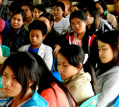The Salween Institute blends objective analysis and hands-on community empowerment programs to frame policy debate and help shape public policy in Burma/Myanmar based on social justice, environmental responsibilities and ethnic right to self-determination.
Analyses & Reports

Empowerment

Advisory Services

Support Us
|
Making All-inclusive Peace a Reality
By Saw Kapi
At the recent ethnic summit held in Karen State’s Law Khee Lar on June 2-9, ethnic leaders reviewed the draft Nationwide Ceasefire Agreement (NCA), drafted and provisionally agreed upon by the Nationwide Ceasefire Coordination Team (NCCT) and the government’s Union Peacemaking Work Committee (UPWC). After several days of serious deliberations, representatives of the ethnic armed organizations (EAOs) offered government interlocutors a golden opportunity for sustainable peace. The EAOs asked that the ceasefire deal be inclusive of all, with some seemingly small but essential edits to the draft. It is now up to the government to embrace this offer and make a nationwide ceasefire a reality. In order for Burma’s peace process to be sustainable, it is important that both sides agree on each and every detail included in the draft NCA. Some points of contention in the draft may seem rather small, but all are vital. In the interests of peace, it would be ill-advised for the government to entirely dismiss negotiating with the EAO’s newly formed negotiating committee, officially called the Senior Delegation for Nationwide Ceasefire Negotiation, which will assume the responsibilities of the NCCT. Adopting an uncompromising approach at this stage, when the process has already come such a long way, risks derailing the peace process altogether. The consequences of such a derailment would not, as well all know, be in anyone’s interests. In fact, negotiations at their heart were never about whether or not to sign the NCA on paper. At the Law Khee Lar summit, it was obvious that ethnic leaders were keen to sign the NCA—once both sides reached a final agreement on all points. Ethnic leaders made it very clear that no one should be left behind under the pre-text of the government’s “open book” policy, whereby some ethnic armed groups could sign on at a later date. The shared view of EAOs is that only if all of them sign can the deal truly be called “nationwide.” Despite serious concerns over the Burma Army’s six-point principles, insisted upon repeatedly by army chief Snr-Gen Min Aung Hlaing and the Ministry of Defense’s representative in the peace process Lt-Gen Myint Soe, both in person and through the media, EAOs have continued to negotiate in good faith and to date remain committed to the process. The six points demand in part that ethnic armed groups uphold any pledges made in the peace process, follow the rule of law and respect Burma’s military-drafted 2008 constitution. Ethnic leaders know all too well that they cannot completely ignore potential stumbling blocks to the peace process or vaguely worded stipulations that may come back to haunt them. Yet they are willing to take colossal but calculated risks for the sake of a genuine, sustainable and nationwide peace. Now that a new ethnic negotiating committee has been formed to take the process forward, it is hoped that the government negotiation team keeps an open mind and works in good faith towards a possible historic moment of unity. Saw Kapi is a co-founder and director of the Salween Institute for Public Policy. This article appeared in the Irrawaddy online version on July 1, 2015. |

